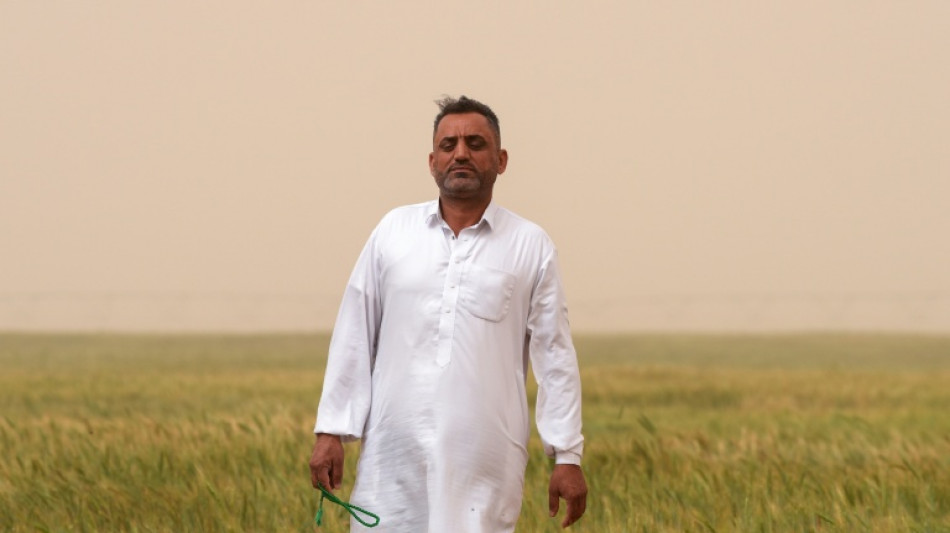
-
 Benfica investigate video of fans' monkey gestures
Benfica investigate video of fans' monkey gestures
-
French minister pledges tight security at rally for killed activist

-
 Guardiola 'couldn't care less' about Arsenal stumble in title race
Guardiola 'couldn't care less' about Arsenal stumble in title race
-
UK police search property as royals reel from Andrew's arrest

-
 Germany's Merz to visit China next week
Germany's Merz to visit China next week
-
Kompany says Mourinho made 'huge mistake' in Vinicius racism row

-
 X appeals EU's 120-mn-euro fine over digital content violations
X appeals EU's 120-mn-euro fine over digital content violations
-
Galthie recalls hulking locks Flament, Meafou for Italy

-
 Turkey, Saudi sign major solar power deal
Turkey, Saudi sign major solar power deal
-
US Olympic freeskier Hess embraces 'loser' tag after Trump blast

-
 European stocks rebound, oil prices ease after US-Iran volatility
European stocks rebound, oil prices ease after US-Iran volatility
-
'Alpha male' AI world shuts out women: computing prof Hall

-
 New Zealand freestyle skier Ives in hard Olympic crash
New Zealand freestyle skier Ives in hard Olympic crash
-
New Zealand must adapt quickly to Sri Lanka wickets: Chapman

-
 Thai activist's jail term for royal insult extended to 30 years
Thai activist's jail term for royal insult extended to 30 years
-
Families of Duterte's drug war victims eye Hague hearing with hope

-
 India chases 'DeepSeek moment' with homegrown AI
India chases 'DeepSeek moment' with homegrown AI
-
UN touts panel for 'human control' of AI at global summit

-
 Ukraine Paralympics team to boycott Opening Ceremony over Russian flag decision: statement
Ukraine Paralympics team to boycott Opening Ceremony over Russian flag decision: statement
-
UK monarchy reels from Andrew's stunning arrest

-
 Somaliland, where Muslims love Israel
Somaliland, where Muslims love Israel
-
Florida airport to be renamed after US President Donald Trump

-
 Fans flock to Japan zoo to see viral baby monkey Punch
Fans flock to Japan zoo to see viral baby monkey Punch
-
Stocks mixed, oil rises after Trump Iran threat

-
 Outspoken Laos lawmaker's election exit sparks rare dissent
Outspoken Laos lawmaker's election exit sparks rare dissent
-
Kim Jong Un vows to boost living standards as he opens rare congress

-
 Shepherd hat-trick to Samra ton: Five top T20 World Cup performances so far
Shepherd hat-trick to Samra ton: Five top T20 World Cup performances so far
-
Zimbabwe surprise as T20 World Cup Super Eights begin without Australia

-
 Victorious Takaichi promises 'strong and prosperous' Japan
Victorious Takaichi promises 'strong and prosperous' Japan
-
Ex-South Korea leader apologises for martial law crisis

-
 Ex-S. Korea leader apologises for martial law crisis
Ex-S. Korea leader apologises for martial law crisis
-
Messi kicks off MLS season in key World Cup year

-
 Teen burnout to Olympic gold: Alysa Liu 'looking to inspire others'
Teen burnout to Olympic gold: Alysa Liu 'looking to inspire others'
-
Cunningham stars as NBA-leading Pistons ease past Knicks

-
 Andre Gomes joins MLS side Columbus Crew
Andre Gomes joins MLS side Columbus Crew
-
Scottish inconsistency 'bugs everyone' says former international Beattie

-
 England turn to Pollock for Six Nations boost against Ireland
England turn to Pollock for Six Nations boost against Ireland
-
Arsenal aim to banish title jitters in Spurs showdown

-
 Scrutiny on Flick rises as Barca seek recovery
Scrutiny on Flick rises as Barca seek recovery
-
Leipzig host red-hot Dortmund with Champions League hopes slipping away

-
 Nvidia nears deal for scaled-down investment in OpenAI: report
Nvidia nears deal for scaled-down investment in OpenAI: report
-
Japan inflation eases in welcome news for PM Takaichi

-
 McIlroy shares Riviera clubhouse lead as Rai charges, Scheffler fades
McIlroy shares Riviera clubhouse lead as Rai charges, Scheffler fades
-
Philippines' Duterte earned global infamy, praise at home

-
 Stocks drop, oil rises after Trump Iran threat
Stocks drop, oil rises after Trump Iran threat
-
As European heads roll from Epstein links, US fallout muted

-
 Families of Duterte's drug war victims eye Hague hearing hopefully
Families of Duterte's drug war victims eye Hague hearing hopefully
-
Russian decision is a betrayal: Ukrainian Paralympics chief

-
 Venezuela parliament unanimously approves amnesty law
Venezuela parliament unanimously approves amnesty law
-
Martinez missing as Inter limp to Lecce after Bodo/Glimt humbling


Iraq farmers turn to groundwater to boost desert yield
Farmer Hadi Saheb cannot wait to see his wheat fields flourish in the heart of the desert after he tapped into groundwater reserves in water-starved Iraq.
He is just one of many Iraqis who have turned to drilling wells in the desert to help sustain the country's agriculture.
It is a risky move that threatens to deplete the groundwater in a nation already battered by frequent drought and scarce rainfall.
Although Iraq's fertile plains traditionally stretch along the once-mighty Tigris and Euphrates -- the two rivers whose levels have plummeted -- Saheb's vast lands lie in the heart of the southern Najaf desert.
"Year after year the drought worsens, and the desertification intensifies," said the 46-year-old, dressed in a white abaya as a duststorm swept through the area.
So he has turned to groundwater, taking advantage of a government initiative.
This leases desert land to farmers at a symbolic price of one dollar per dunum (0.25 hectares in Iraq's measurement), provides subsidised irrigation systems, and buys their harvest at a preferential rate.
Now that he doesn't have to rely solely on rainfall, Saheb said he cultivates 20 times more land than before, and his harvest has increased to 250 tons.
"It would be impossible to continue without groundwater, which we cannot extract without drilling wells," he said.
Like many other farmers, Saheb has upgraded his irrigation techniques.
- 'Strategic reserve' -
He now relies on a centre-pivot method involving equipment rotating in a circle to water crops through sprinklers.
This uses at least 50 percent less water than flooding -- the vastly more wasteful traditional way used for millennia, during which the land is submerged.
According to the agriculture ministry, Iraq cultivated 3.1 million dunums (775,000 hectares) this winter using groundwater and modern irrigation systems, while the rivers watered only two million dunums.
In Najaf, desert farming has expanded significantly.
According to Moneim Shahid from Najaf's agriculture authorities, crop yields have been boosted by new irrigation methods, tougher seeds and fertilisers suitable for arid soils.
Shahid said he expects a harvest in Najaf this year of at least 1.7 tonnes of wheat per dunum in the desert, compared with 1.3 tonnes in areas irrigated by rivers.
Last year Iraq had a very good harvest, exceeding self-sufficiency with a production of 6.4 million tonnes of wheat, according to agriculture ministry figures.
Religious institutions such as the Imam Hussein Shrine in the holy city of Karbala back the authorities and also support desert farming.
Qahtan Awaz from the shrine's agriculture department said the institution, which employs families to farm desert areas, is cultivating 1,000 hectares and aims to more than triple that amount.
Today, groundwater reservoirs help mitigate agricultural losses caused by drought, an already frequent phenomenon in Iraq that is worsened by a warming planet.
But preserving those resources is proving to be a challenge.
Shahid from Najaf's agriculture authorities, said "we should be vigilant" in protecting groundwater, calling it "a strategic reserve for future generations".
Its use "should be rationed ... and sprinklers could help regulate consumption", he said.
- Depleting supplies -
The Najaf desert lies above the Umm el-Radhuma and the Dammam aquifers, which Iraq shares with neighbouring Saudi Arabia and Kuwait.
Water levels in both aquifers have declined, according to the United Nations which has also voiced caution that aquifers worldwide are depleting faster than they can be replenished naturally.
A 2023 UN report warned that Saudi Arabia used much of its groundwater to grow wheat in the desert, depleting more than 80 percent of its resources and forcing authorities to stop cultivating wheat after 2016.
Sameh al-Muqdadi, a water politics and climate security expert, warned that Iraq's groundwater levels have already dropped.
Water used to be found 50 or 100 metres deep (165-330 feet), but today wells are dug 300 metres deep, he said.
"People believe that these resources will stay forever... which is not true," Muqdadi warned.
Authorities have no estimates for Iraq's groundwater, and the most recent figures date back to the 1970s, he said.
"If you don't have any estimation, you cannot manage your resources."
"Groundwater is a contingency measure, and it should be used only in urgent cases" such as droughts "to sustain food security only", not to expand farmland for commercial purposes, Muqdadi said.
But unfortunately, "this is what we have nowadays".
P.Stevenson--AMWN

